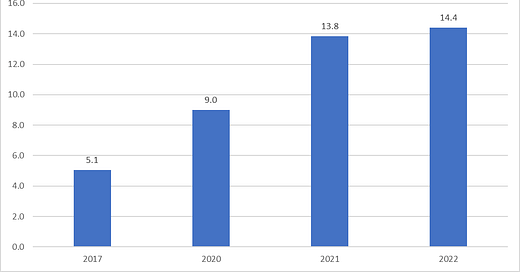Locals Driving Corporate Reforms and 10 Korean Companies Recently Announcing Share Cancellations
In a recent discussion with a client, one of the questions that was raised was regarding the impact the local investors are having on the corporate governance reforms in Korea.
The number of local investors in the Korean stock market has jumped in the past few years from 5.3 million in 2017 to 14.4 million in 2022.
All in all, I think Korea is about 3-5 years behind Japan in various corporate governance reforms. So it has a lot of catching up to do.
Locals (Not Just Foreigners) Driving Corporate Governance Reforms in Korea
In a recent discussion with a client, one of the questions that was raised was regarding the impact the local investors are having on the corporate governance reforms in Korea. My answer to this question was absolutely the locals are helping to improve the corporate governance reforms. This is one of the key reasons why the pace of corporate governance reforms in Korea is likely to accelerate in the next several years.
The number of local investors in the Korean stock market has jumped in the past few years from 5.3 million in 2017 to 14.4 million in 2022.About 88% of the population in South Korea are aged 15 years or older so about 30% of this population bracket in South Korea were investors in local stock market in 2022, up sharply from only about 10% in 2017.
About 15-20 years ago, there were several high profile cases such as Sovereign Asset Management's attempt to improve corporate governance of SK Corp and Icahn's fund trying similar strategy on KT&G Corporation (033780 KS). In both cases, the attempts to drive the corporate governance reforms were conducted by major foreign funds. In both cases, the local media and general mood of the people in Korea back then were to "drive out the foreign investors." [Remember, this was only a few years after the traumatic Asian economic crisis in 1997/1998].
I would argue that things have changed materially since then. All three important moving parts (Korean government, Korean people/investors in local stock market, and Korean media) are now much more supportive of making positive changes in the corporate governance reforms.
Although the local stock market and corporate governance measures still trail the more developed markets such as the United States and Japan, I sense much less hostility on foreign/local funds that are trying to improve corporate governance reforms which are likely to raise the long-term shareholder returns as well.
All in all, I think Korea is about 3-5 years behind Japan in various corporate governance reforms. So it has a lot of catching up to do. Meanwhile, the extra alpha in Korea is likely to be in companies that are actively buying back/cancelling shares and paying out higher dividends with excellent growth prospects.
Keep reading with a 7-day free trial
Subscribe to Douglas Research Insights to keep reading this post and get 7 days of free access to the full post archives.



